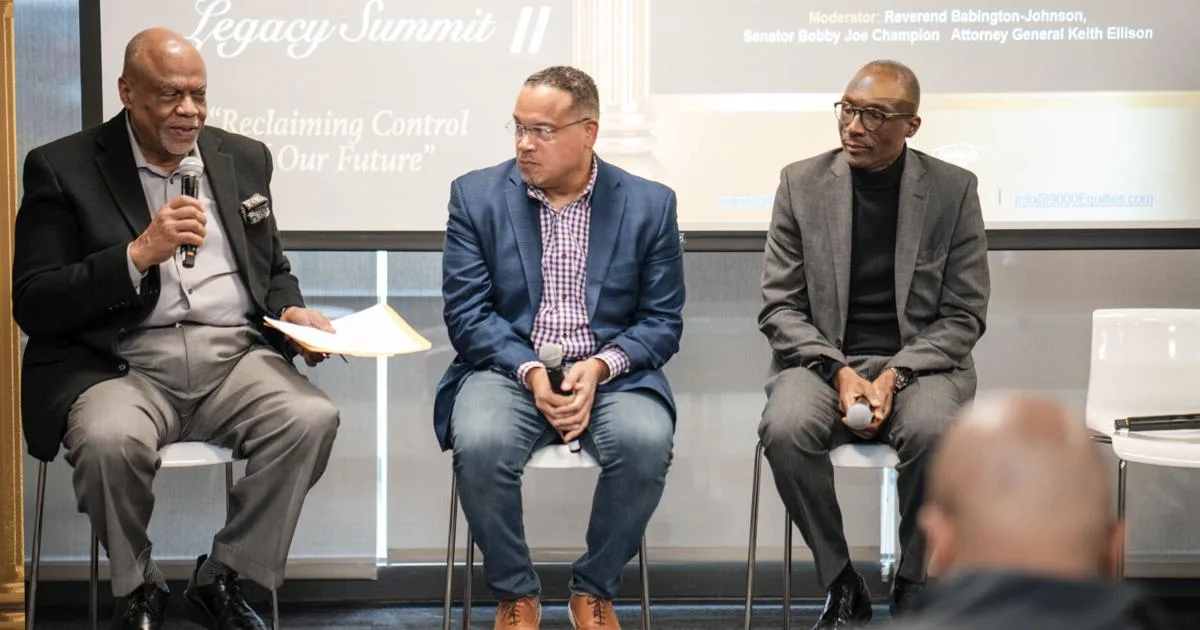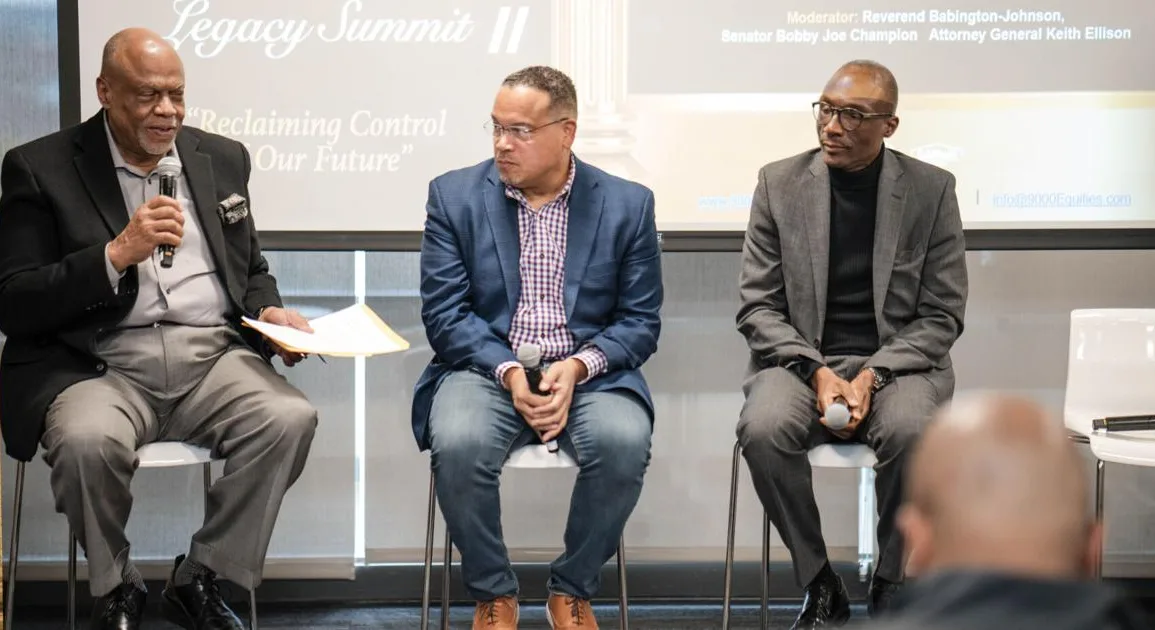
This is the fourth in a series of articles about building wealth in our community. These are excerpts from comments made by Minnesota Attorney General Keith Ellison and President of the Minnesota Senate, Senator Bobby Joe Champion on a panel moderated by Alfred Babington-Johnson at Black Men’s Legacy Summit II, Oct. 28th at the Regional Acceleration Center, (also known as the Thor Building), 1256 Penn Avenue North, Minneapolis. Part 2 of this article continues next week.
Babington-Johnson:
Sometimes we look at things and we don’t know what we’re seeing. As you’re looking at these two gentlemen before you, I’m not sure that you even understand what you’re looking at. This is, of course, the Attorney General of the State of Minnesota, Keith Ellison. And this is the President of the Minnesota State Senate, Bobby Joe Champion.
Both of them are our neighbors. Both of them live in the Northside of Minneapolis. One was born here.
Two things I want you to understand as you look at them: First, understand they are you. Look at them closely and then recognize they are you. Then I want you to understand that in the State of Minnesota, in the political sphere, you’re looking at two of the top three most powerful men in Minnesota state government.
I don’t even think you get it. There’s the governor. He’s the most power political figure. Now we have the attorney general here, who is in the Governor’s cabinet, and also a member of what they call the Executive Council. That’s made up of five people – the Governor, the Lieutenant Governor, the Secretary of State, the State Auditor, and the Attorney General.
But if the governor and the lieutenant governor for some reason ended up both being sick or something bad happened, do you know who would be the governor of the state of Minnesota? Bobby Joe Champion, as the President of the Minnesota State Senate. He is third in line to be governor of the state.
So, you are looking at two of the three most powerful men in the state government They’re Black and they live on the north side. And they are you. So we really wanted this discussion to be about what we call the journey, because they are you. point?
North Minneapolis and Detroit are starting points in your life stories. But if you were writing your autobiography, what would you say about the beginning of your journey?
Keith Ellison:
Well, the beginning of both of our journeys to start before either one of us were born. And those journeys begin in Africa, and then they go to the American South, in my case, Louisiana, Georgia, Bobby’s people from Texas, Hooks, Texas.
Bobby Joe Champion:
You remember that too.
Keith Ellison:
Brother, I know you. And so let’s keep that in mind. We need to think of each other as not individual dots on a line, but as a point of a river flowing that includes not only your ancestors but your descendants, both. And think of that that way. Indispensable parts in my journey quite honestly had to do with when my mom was from Natchitoches Parish, Louisiana. Her father, my grandfather, Frank Martinez, would organize Black voters. The whites would threaten to blow up the house so much that my mom had to go to a boarding school in Lafayette, Louisiana called Holy Rosary. They burned a cross in front of the house. My grandfather had to put tractor fuel in his car because the white business owners boycotted him. And that experience definitely shaped my mom.
My mom, when she went to Xavier in New Orleans, she would grab the “white’s only” signs, which were movable on the bus and she would take them. And she said, “I must’ve had about 20 of them in my dorm room by the time I got out of Xavier.” And so she raised us like that.
And I’ll just say this one last thing. You all remember the Pulse nightclub where there was a massive shooting in Orlando, Florida. My mom calls me and she says, “John Lewis is doing a sit-in on the house floor to protest this. And I want to know why you’re not down there. I looked on the TV and I didn’t see you.”
I closed my meeting and I went down there. So that’s a little bit about the shaping.
And I’ll tell you this, one of the thing about Bobby, neither the governor nor I can get one penny to run our offices without Bobby.
And it’s sure nice to know that my friend of decades lives three blocks away from me. I can just say, “Bob, we really need some money for X, Y, and Z.” And Bob tries to do it. We’re not just Black men, we are brothers working together.
Look, if you’re just some Black star at the top of some mountain all on your own, we stand back and say, “Isn’t he awesome?”But it doesn’t do us any good. You ascending to leadership should do us some good.
Babington-Johnson:
Amen. Amen.
Bobby Joe Champion:
Well, let me say first of all, thank you to Alfred Babington-Johnson and my brother Keith. You heard me chuckle when he remembered that my mom is from Hooks, Texas and my dad is from Hope, Arkansas.
Everything Keith said about Africa and coming through in the South is significant. And what’s also significant, for me, is that I was born and raised in North Minneapolis.
And that doesn’t mean the exclusion of anyone else, but let me tell you the significance of that for me. Because growing up, if you lived in North Minneapolis, there were those outside of North Minneapolis that didn’t think you were anything. They didn’t think you could accomplish anything. They didn’t think you were about anything.
But I grew up on Seventh and Penn.
My mom and dad migrated from the South to the North. I didn’t realize this until later, but my mom and dad made us go south every year. We spent at least two weeks in the South – they called it homecoming – where all my other cousins and others would come. And we couldn’t just get there and act like we were on vacation. We had work that we had to do while we were there because we were a member of a family.
We were always taught that we were from greatness. And even if other people couldn’t see it, it was important for you to know it.
No matter what you said you could not do, they always told you that you could. Being the first person to ever even go to college, for me to be on the Macalester College campus and to realize that I could not go back home and not have this degree, even if I had to take three buses to school and three buses back home because I didn’t have enough money to stay on campus. But guess what my parents expected of me and what other people in my community expected of me.
“We expect you to go do your very best over there.
And that was clear and that was important for me. It’s because every step along the way, the very people who were ostracized and said couldn’t be anything, ended up doing great things.
Keith Ellison:
I remember one time with my uncle selling newspapers in Detroit downtown. And there were different newspapers. The Detroit News, Detroit Free Press, and Michigan Chronicle, three different newspapers. I’m like nine or 10. People usually point to a paper. I’d hand it to them, take the money and give it to my uncle. So one time a man said, “Give me a paper.” And I grabbed a paper and I handed it to him and he looked at it and said, “I don’t want this damn Black paper.” And I was like, “looked like black and white to me.”
It was the Michigan Chronicle. It was African-American paper. It was basically the equivalent of Insight News with Al McFarlane right here. And that was the first time in my life that it ever registered to me that for some people, being associated with Blackness was not good. My parents sheltered me. I mean, look, I had to do chores like every other kid. But in terms of that nasty racism up in your face, we had Black pictures of people around the house. We had people who spoke well of us. We had people who we admired. So walking into that larger world, all these people in downtown Detroit were walking back and forth fast, most of them white, most of them in suits. And I got the impression that I was in a place where important people were. And this important person made that comment and my uncle had to debrief with me for about a good hour and a half.
Another pivotal experience, if I may share it – my grandfather could not read and write in the English language. I didn’t know that because I was certain he’s the smartest person in the world. He was a factory worker, came up from Sardis, Georgia and was working at Ford Motor Company. He actually bought a couple of duplexes. And he would have me and my brother cut the grass for him. And he used to always walk around with his glasses like this. And he said, “Hey, make out a receipt for them, them and them.” And I would make out these receipts all summer long. And one day I go home and I’m rummaging through the kitchen looking for something to eat. And my mom says, “How you doing honey?” What are you looking for?” And “Oh, I’m looking for something to eat.”
I said, “How come Grandpa always has us write out the receipts? I asked him why he asked us that. And he said, I can’t find my glasses, boy. Just write out the receipt.” And so I just brought out the receipt. My mother is a very sweet kind woman. She goes, “Don’t you dare embarrass your grandfather.” “Embarrass grandpa? What are you talking about?” “He didn’t get to go to school like you did. They didn’t let Black people go to school. They made him be in the field. And so you be grateful that you got to go.” And I was shocked that perhaps my grandfather didn’t have a command of the written word. And it taught me a lesson that is never forgotten. Even when I was a public defender, Bob, I would always say to some of my older clients, “Would you like me to read this for you?” Because I never wanted to put them in a position where they… You know what I mean?
And if they say, “No, I got it”, then fine. But some of them would say, “Yeah, yeah, go ahead.” And I didn’t judge them, but I just knew that this country had taken something and denied something as basic as literacy to not only our great great great-great-grandparents, but to our grandparents. The people sitting in this very room, I bet you have you all grandparents never got a chance to go past the second or third grade. Think about tha
Bobby Joe Champion:
I believe that every experience is a part of building who you are today, not just one thing. And so as I mentioned, when we would go south, it was really significant to me because my Aunt Honey or my Uncle Fred or my grandmother who was in Hope, lived in a shotgun house.
But they were always talking about the importance of family and progress.
I first met Mahmoud El-Kati in North Minneapolis when he was at The Way youth center teaching the African American/African History class. Spike Moss shut down all the recreational activities and made everyone attend his class. You had to. It wasn’t even a choice. If you wanted to play pool, if you wanted to go run track, you had to go to African History class.
I began to understand our history and how we were part of that history. And they would always say to us that it’s important for you to make a contribution to our upward progress. And the other example to me was Stevie Wonder was pushing for Martin Luther King’s birthday to be a national holiday even before it became vogue. The Way had us get on the bus and ride from North Minneapolis to Washington DC so we could be a part of that protest calling for Martin Luther King’s birthday to be a holiday. At that time Stevie Wonder was giving a speech about the world as an orchestra and we have to do our part and play our part. And I ran around the back of the Capitol when I thought that Stevie Wonder would be getting in a car and saw him. And most people who know me know that I had a stuttering problem at the time. So it was difficult for me to get my words out because I was shocked that he was actually there. And he said “Yes?” I said, “Mr. Wonder, Stevie Wonder, it’s so great to see you.” He says, “I’m glad that you’re here. But you have to understand that you have to make a contribution too.”
And that was a profound moment for me because he made it very clear that we all had to make a contribution. And I started thinking, “Well, what is my contribution going to be?”
Continued next week.



